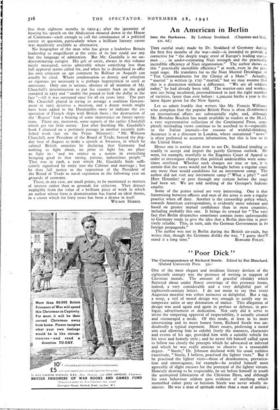An American in Berlin
Into the Darkness. By Lothrop Stoddard. (Chapman and Hall, izs. 6d.) THIS careful study made by Dr. Stoddard of Germany during the first five months of the war—only—is intended to provide a corrective for " the deeply tragic error of Europe's leading states- men . . . in under-estimating Nazi strength and the practically incredible efficiency of Nazi organisation." The author shows us this " practically incredible efficiency " at work, even in the pre- natal stage. He translates for us the Nazi Marital Decalogue or " Ten Commandments for the Choice of a Mate." Actually, " marital " is written (p. 170) " martial," but we may assume that this is a distinction without a difference. " We are all soldiers today," he had already been told. The warrior-ants and worker- ants are being incubated, preconditioned in just the right number of varieties, faster than ever before: i,3oo,000 births a year is the latest figure given for the New Sparta.
Let us admit frankly that writers like Mr. Francis Williams who complain that the popular British Press is often ill-informed on international affairs are substantially right, and, although Mr. Brendan Bracken has made available to readers at the M.o.I. a very representative collection of the Continental Press, com- pletely misleading views continue to be ascribed to it—especially to the Italian journals—for reasons of wishful-thinking. Accuracy is at a discount in London, where sensational " news " is often preferred to accurate information, but this is less so in the United States.
Hence one is sorrier than ever to see Dr. Stoddard tending so readily to accept and impart the purely German outlook. He went, for example, trustfully to the Eugenics Court of Appeal in order to investigate charges that political undesirables were some- times sterilised. Whether such charges are true or not, it is certain that the cases would not be brought before a regular court any more than would candidates for an internment camp. The author did not visit any internment camp (" What a pity! " said Herr Himmler) or peer through any curtain before the stage had been set. We are told nothing of the Gestapo's hideous cruelty.
Some of the points raised are very interesting. One is that fraternising between officers and men of the army is now a regular practice when off duty. Another is the censorship policy which, towards American correspondents, is evidently more tolerant and based on greater mutual confidence than in most countries, including probably this one. It brings its reward for " The very fact that Berlin despatches sometimes contain items unfavourable to Germany tends to give the idea that a Berlin date-line is posi- tively reliable. This, in turn, aids the German Government in its foreign propaganda."
The author was not in Berlin during the British air-raids, but writes that, though the Germans dislike the war, " I guess they'll


























 Previous page
Previous page